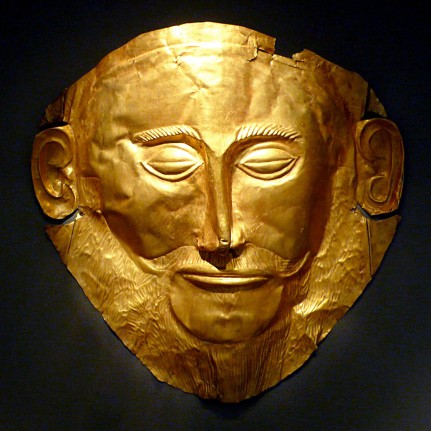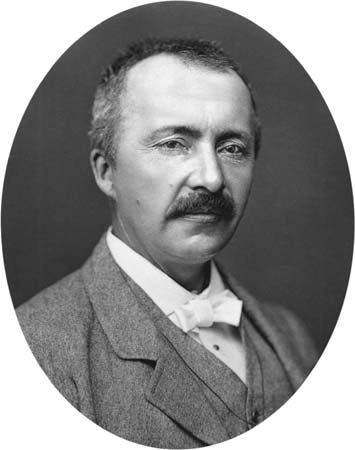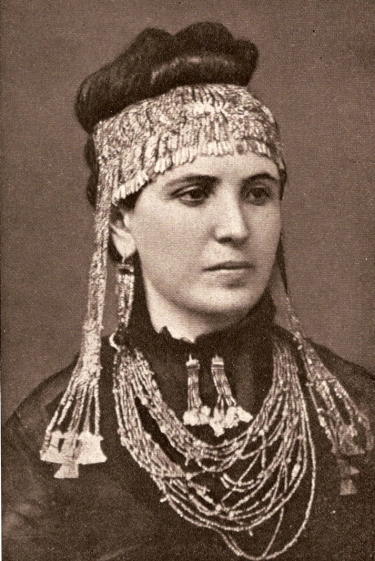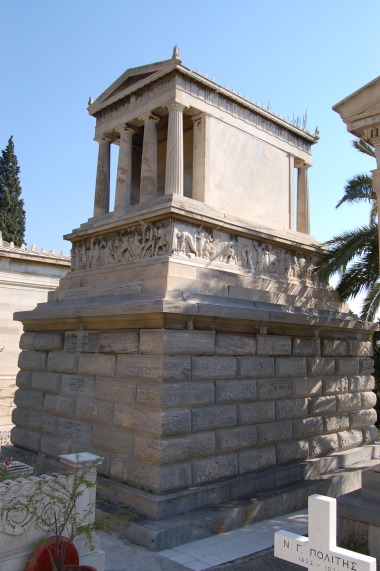
A golden mask found by Schliemann that he named “The Mask of Agamemnon” which he did not, in fact, find on Agamemnon. >eyeroll<
Where is Troy located? That’ll be a question most people might be asking themselves mid-binge of Netflix’s new HBO inspired show Troy: Fall of a City. And while I just recently complained to NonWashable on our podcast about the prevalence of historical dramas desperately trying to be the next Game of Thrones despite a wealth of interesting material beyond boobs in HD, I’m willing to give this one a watch (5 minutes in and it already featured stirrups but oh what the hell). But, before I do, I’ll be raising my fist and cursing the name Heinrich Schliemann to the Gods. Because if you were wondering where you could find the historical and ancient city of Troy featured in The Illiad today, the answer is you can’t. Heinrich Schliemann destroyed most of the main site.
Who was this dogfaced [1] rich dude who is famous for helping found scientific archaeology and also foolhardily inspiring the “oh my god for the love of all that is holy do not do this” guide to digging up relics and excavating sites?
Born a pastor’s son in 1822, Heinrich Schliemann grew up incredibly poor. But what his family lacked for in wealth they made up for in notoriety, for when Heinrich was a young boy, his father was publicly accused of adultery. Presumably, in no less the same fashion of shame and ridicule as the Scarlet Letter (but probably without the emblem ‘A’). Not soon after, Heinrich’s mother passed away when he was only 9 years old forcing his father to send him off to live with his uncle. It’s somewhere here where Heinrich’s love for Homer began. [2]

The problem is, nobody can really be sure. There is a clear divide among scholars on whether or not Heinrich Schliemann is a “pathological liar”, a fraud, or even worthy of our contempt in the first place. Did he falsify his findings and over exaggerate his passion for Homeric epics to fit his narrative? Or was he a product of his time, still spear-heading an infantile science and ushering in the wave of Bronze Age Archaeological interest? [3] Whether or not it’s true that Heinrich confessed to his father at the age of 7 of harboring a dream to uncover the heroes of the Trojan Wars and prove their validity, we can absolutely be sure that he was, at one time or another, obsessed with all things Greek.
Heinrich Schliemann’s rag to riches story is so wild and fitting, most have rightly wondered how much of it was embellished for dramatic effect like he was some kind of swashbuckling Casanova. After his father wasn’t done being a piece of work and was accused of embezzling church funds, Heinrich was forced to go to vocational school without the prospect of an education at University. Pulling up his bootstraps, he apprenticed at a grocery at 14 years-old where apparently he heard a drunk miller reciting Homeric verse which incited his passions (Okay, which is it, Heinrich?). [2] After this he ended up on a merchant ship somehow and happened to be shipwrecked, survived it and hitched up in Holland shuffling through random jobs before managing to get into imports/exports. Then, of course, he became involved with the California Gold Rush, because why not. Rolling in the gold dust, he took himself to Russia where he struck even more gold selling indigo and then explosives to the Russian military during the Crimean War like some glorified Tony Stark. By the age of 36, he was a polyglot and so incredibly rich he could retire for the rest of his life in Avenger’s tower. (By modern estimates, at the time of his death, Schliemann would have been worth around 72 million dollars) [3]
But happy, he wasn’t. At this point, he had become disenchanted with his life in business and even more so with his wife. Writing to his father, he called out the “lies and deception” of the business world and spoke of wanting to travel to Greece where “Philogy and archaeology will provide me with plenty of useful labor for a long time.” As if in the throes of a mid-life crisis, he dove headfirst into Grecian life like a prepubescent boy discovering anime for the first time. He went to Paris to study archaeology and focused on studying everything he could about Ancient Greece, including teaching himself the language. Having dealt with plenty of Greeks during his numerous business dealings, he harassed everyone he knew that could provide him on any study materials they could possibly possess so that he could absorb everything he could about Ancient Greece going so far as to refer to the octopus shaped country as his ‘fatherland’. [2]
Thoroughly fed up with his Russian wife too, he committed residency fraud in the United States so that he could get a divorce and then immediately ran off to Athens to find the first young Greek woman he could get to respond to a newspaper advert and marry him, who was only a paltry 30 years his junior. He had two kids named Andromache and Agamemnon and baptized them using a copy of The Illiad just in case anyone doubted his dedication to being a Graecophile fetishist.
Armed with a spry Greek wife with knowledge of the culture and a PhD awarded in absentia over a submission that he has since been accused of cribbing from another author’s work, he was set to start digging. [4]
He came into archaeology in an intuitive rush, in a mid-life crisis, and the scholarship, reasoning, and excavation technique all had to be developed later. – Easton [3]
But where? Heinrich Schliemann is falsely attributed to having discovered the historical site of Troy but despite his claim, it’s patently untrue. The archaeological site where Heinrich spent the majority of his career, Hisarlik, was already tested by Frank Calvert, a colleague of Schliemann’s who advised him to start digging there. Prior to that, Hisarlik was noted as a potential archaeological site by Richard Pococke in 1740 and then Franz Kauffer in 1793. It was Edward Daniel Clarke in 1801 who first identified it as Classical Ilium based on found coins and inscriptions, and then Charles Maclaren claimed it to be Homer’s Troy. Heinrich wasn’t even the first one to dig there, that would be John Brunton which was then followed by Frank Calvert who was unfortunate enough not to gain wide funding from the British Museum to excavate even further, passing along his knowledge to Heinrich Schliemann and thereby losing his place in the popular culture’s imagination as a hero of Archaeology. So, no, Schliemann did NOT discover Troy. He was, however, the first to excavate it on such a wide scale. [3]

Schliemann’s wife Sophia, photographed wearing some of ‘Priam’s Treasure’. Schliemann had claimed she was present upon discovery of the treasure and helped dig it out of the trenches but later admitted she was in Athens at the time.
And, excavate he did, using winches, crowbars, battering rams, and freaking dynamite. Plowing his way through the soil, he assumed that his Troy would be at the bottom, and so, ironically, crushed right through the real layer of historical Troy that would have featured in The Iliad. It was in those early layers of Troy where he found Priam’s Treasure. Or didn’t, according to some scholars who ascertain that he planted the treasure in order to validate his find of Homer’s Troy. [5] Either way, the treasure haul has since been dated 1,000 years before the events of The Iliad, so it certainly didn’t belong to Priam. But naming things after Iliad things was Schliemann’s jam, and just to confuse everyone he “found” (or maybe didn’t, there are scholars who say this was a fake too) [7] a golden funerary mask at Mycenae that he claimed to belong to Agamemnon even though he found no other evidence to suggest it belonged to him, you know, a corpse sometimes helping with that. The golden mask, again, was dated to 300 years prior to the Trojan War. But that’s the trouble with Schliemann.
What he wanted was to uncover the Homeric world, to know whether it existed, whether the Trojan War happened. But here also is a weakness. He was not very good at separating fact from interpretation. It is a recurrent problem in Schilemann. The burnt citadel of Troy II was Troy; the gate was the Scaean Gate; the building inside the gate was Priam’s palace, and the treasure was Priam’s Treasure. – Easton [3] But he was wrong. So wrong.
And maybe that’s why some scholarship has yet to forgive him. Obviously, radiocarbon dating had yet to exist, and neither did topographical 3D imagery. The field of Archaeology, if you can even definitively call it that at this time, was rudimentary. And despite his faults in excavating, his gold-seeking motives, or his questionable education in the discipline, Schliemann did help pioneer the science of archaeology by surrounding himself with a specialist team of photographers, surveyors, anthropologists, botanists, ancient historians, etc. [3] So where do we draw the line?
Heinrich Schliemann made Archaeology fashionable. He wrote of his experiences and findings like he was a travel blogger and he had the world’s attention, he was a rockstar. [6] He also smuggled treasures out of Turkey and dug regardless of denied permit by the Ottoman government. [3] Schliemann ushered in popular interest in Bronze Age Archaeology, sparking a new wave of excavation among the Aegean. He also inspired Arthur Evans in the excavations of the Minoan civilization, which though groundbreaking, was not without its problems–namely, the commissioned and reconstructive paintings of the actual ruins in order to make them “pop”.
Heinrich Schliemann was a champion of Greek historicity and, decidedly, not–initiating and funding the removal of a Frankish Medieval tower because it simply wasn’t ‘Classical’ enough. And it seems, this same tension exists in scholarship as well. Was he a pioneer or a pathological monster?

Siiiigh. Heinrich Schliemann’s grave site…
So which legacy of Schliemann do we go with? The douchebag who lied and swindled his way to an obsession in hunting treasure without a thought to rigid scientific integrity in weighing his claims against evidence? The guy who made it all up as he went and blasted his way through a valid archaeological site with the chutzpah to do it without even a modicum of discipline? OR do we praise him for his rigid documentation of flora, pottery, and fieldwork and his diligence in watching over his own dig site all hours of the day? The guy who, technically, didn’t know any better but was able to make some headway with his unlimited funds and helped to foster an environment where Archaeology was seen as a legitimate and necessary field of interest?
All I know is, given the disposable income, I find myself wondering how much of Schliemann I’d be if given the opportunity. A young kid with a lifelong dream of digging in the dirt trying to find History Heroes? At least, I can say, I wouldn’t have used dynamite.
But perhaps Heinrich Schliemann was simply all of us.
And we are all assholes.
Fact Check it, Yo!
[1] “Dogfaced” was a delightful insult Homer used often in The Illiad, and, I’m sure, he’d approve of referring to Schliemann as such. Stable URL: http://www.jstor.org/stable/25000142
[2] TURNER, D. (1990). HEINRICH Schliemann: THE MAN BEHIND THE MASKS. Archaeology, 43(6), 36-42. Retrieved from http://www.jstor.org/stable/41765885
[3] Easton, D. F. “Heinrich Schliemann: Hero or Fraud?” The Classical World, vol. 91, no. 5, 1998, pp. 335–343. JSTOR, JSTOR, www.jstor.org/stable/4352102.
[4] Traill, David A. “Schliemann’s Mendacity: A Question of Methodology.” Anatolian Studies, vol. 36, 1986, pp. 91–98. JSTOR, JSTOR, www.jstor.org/stable/3642828.
[5] Traill, David A. “’Priam’s Treasure’: Clearly a Composite.” Anatolian Studies, vol. 50, 2000, pp. 17–35. JSTOR, JSTOR, www.jstor.org/stable/3643012.
[6] Maurer, K. (2009). Archaeology as Spectacle: Heinrich Schliemann’s Media of Excavation. German Studies Review,32(2), 303-317. Retrieved from http://www.jstor.org/stable/40574802
[7] Arentzen, W. (2001). An Early Examination of the ‘Mask of Agamemnon‘. L’Antiquité Classique, 70, 189-192. Retrieved from http://www.jstor.org/stable/41660776
What a bizarrely fascinating tale. When you first told me about him years ago I was certain, like you were, that he was an incorrigible monster who was more worried about himself than the history. But after reading this it’s hard to hate him completely. We probably would have arrived at modern archaeology regardless of what he did but in the process how much else would we have lost due to figuring it out? One catalyzing tragi-success may have saved us a lot of growing pains.
Also, as insane and “Sure that happened” his early stories and adventures sound the fortune he amassed sort of lends credence to their validity doesn’t it? He may have lied about a lot but clearly he was successful in his travels.
Yeah, I don’t really doubt his career stories personally, crazier things have happened and people were able to get into wilder things back then when you didn’t need a college degree or a resume with the correct font styling to get around. The scholars who do are clearly in the “he’s a pathological liar and narcissist” camp so I thought it’d be worth noting that basically everything this guy says and does is questionable haha
Schliemann was a liar even he was paid by Russians to invent a fals discovery for Troy.
Troy is one of twelve cities of Dardania which is the real name of North and Northeast parts of Arberia Yllirian today Kosovo and Albanian Part Republic of Macedonia. When Russia after 4 wars defeated Turkish around 1870 they signed a treaty in Saint Stephan Bulgaria in which is stated that Albanian lands including Dardania to grant to Russian Satellite countries in Balkan such Serbia and a part to Monte Negro and a part To Bulgaria today Republic of Macedonia, before the orthodox Greek( under Russian control) did a deal with Ottoman Empire to change name of Yllirian Peninsula to Balkan and to ban Albanian language in Balkan based on this deal Greece took Epirus populated by Arbanites ( Albanians) so in the other side Russian paid Heinrich Schliemann to invent Troy to South if Greece inside of Ottoman Empire today Chanakale without any Historical sense because there is no Dardania in Chanakale. Schliemann lied as he found Priam Gold Masque but As Deutschwele has published Civilization forgived Schliemann this mistake because it was not Priam Iron masque and the same time all such political actors change name of Hallespont to Dardanelles. However We Albanians have survived we stopped Turkish and Russinans to invade our lands and not give Russians access to Mediterranean. However Dardania Kosovo is free from Slavic Serbians and Macedonian Albanian is in the way to Fredom so we will create again Great Albania and Dardania Dardanus Troy (Trojet tona =our lands) we speak the old language Pelasgean Yllirian Star Lira will light soon
Pingback: In Defense of Gorgo, Queen of Sparta | Histastrophe!